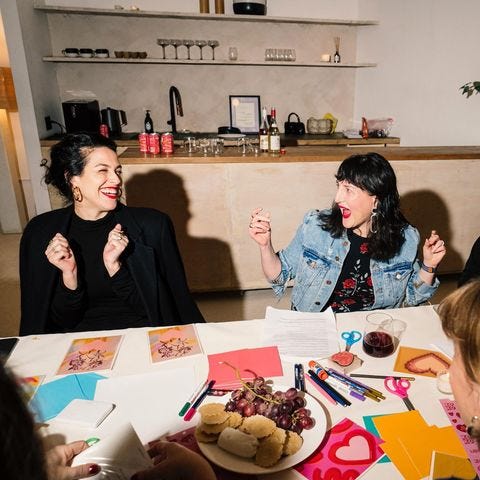Maya Kosoff is a freelance writer, content strategist, and the cofounder of 18 Olives, an independent consultancy based in Brooklyn, New York. She pivoted her career from journalism to consulting, and has advice for a Diemer similarly looking to switch industries after ten years.
But first, here’s what else people are talking about on Diem:
First of all: You’re not alone! Last year the market was rough for job-seekers, and more than half of U.S. workers surveyed said they’re looking to make a career change. In recent years, the world has changed, and the world of work has changed along with it. From the pandemic, to the Great Resignation, to mass layoffs, to unprecedented levels of labor organizing, to the seemingly eternal looming threat of AI taking our jobs, nothing is the same right now as it was 10 years ago when you started working in the industry you’re leaving now.
But regardless of why you’re leaving the industry, it’s normal to be freaking out. All you know is what you’ve poured yourself into doing for the past ten years. I found myself in a similar position to yours in 2020. I had been a journalist for years, and then I gambled on a contract role at The New York Times. When that contract ended in November 2019, the paper wasn’t hiring permanent roles for the section I worked on, and media layoffs had taken the jobs of more than 3,000 of my peers. Companies were consolidating, and there weren’t a lot of new job openings.
So in 2020 I decided to be pragmatic. I knew finding a new job in journalism would be a challenge. I pivoted. I knew I had the basic skills I needed to get a job in a field like advertising, marketing, or financial analysis. After many bad interviews and several good ones, I landed a job at a marketing agency. Working there was like snacking at a buffet — I got to try a little bit of everything skill-wise, from ghostwriting, to copywriting, to media training, to internal communications.
I walked away from that job with something better than the new skills I gained: I had confidence that I was capable of doing so much more, learning new skills on the job, and adapting to new environments. I have carried that into every new job I’ve had since — working at a startup, then a venture capital firm, and now working with startups and VC firms at my own comms and content consultancy, 18 Olives.
Here’s what I’ve learned about switching industries:
Identify your transferable skills.
When I was thinking about moving out of journalism, I made a list of my tactical skills — not just “writing articles,” but breaking down my job almost anthropologically, as if I were a stranger, not someone who’d worked in journalism their entire career. I was good at working under deadlines, interpersonal communication, empathy and creative thinking. I could research anything. I worked with other teams — I was familiar with working in a cross-functional, collaborative way. I had leadership and problem-solving skills. I knew how to use publishing and project management software. I was an expert in finding, organizing and effectively communicating complex information.
I ended up using those skills to power my job search, looking in adjacent fields to journalism — I didn’t know what my next job would be, but I figured I wasn’t going from being a reporter to being a welder or, like, an architect. Then I started applying, noting how my previous experience could make me an asset in the role I was applying to. Being able to tie your previous credentials to a new industry will help you market yourself as a strong candidate, and will answer the hiring manager’s question of why this person with a different work history is applying to this job.Seek mentorship.
I always say that I can’t do anything by myself in isolation, but that I can do everything with peers, friends, and mentors to guide and support me. Today, I’m both a mentor and a mentee. To find a mentor, I looked at people whose careers I looked up to — often, people who used to be journalists who had switched fields themselves — and wrote to them expressing my own desire to change industries, and noting what I admired about their careers. Then I’d ask if I could buy them a coffee or just take 30 minutes of their time on a Zoom or phone call. What I learned through this process is that people want to help you, you just need to be brave and send the email/LinkedIn DM/text. A good mentor can provide valuable guidance and offer insights into their industry. Switching careers is full of uncertainty, and having a mentor can give you assurance during those scary times when you’re nervous about an interview or waiting to hear back from a recruiter.Know that your past work experience is what makes you unique, and uniquely valuable.
I wish someone had told me this sooner. Switching careers doesn’t mean you failed or were unsuccessful, and when you do move into a new industry, all the knowledge and experience you gained from your old industry isn’t disposable. For example, when I went to work at a marketing agency, my skills as a reporter weren’t just relevant — they were highly valued and sought after. I was asked to give presentations to our startup clients, explaining from a journalist’s perspective how to approach media relations. Today, this is a fundamental part of the work I do as a consultant, advising my clients on media relations and how to approach and engage journalists.
✨The Diemer’s Choice Awards are here!✨ We’ve collected some of our favorite Diems, and now it’s your turn to vote. Throughout the week, we’ll be sharing the nominees for:
😈The Cunt Server Award😈
🫡The Trailblazer Award🫡
🏆The Best Overall Award🏆
Vote on Instagram and in the app. Winners announced next week!
ICYMI
Want our weekly roundup of the best of Diem each week? Make sure you’re subscribed to The Briefing!
Before you go…
🔎 ⚡️ Diem app users—we want to hear from you! Take this survey so we can better understand how we might improve our app and make Dieming better for everyone! ⚡️🔎







